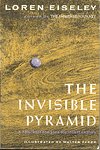Loren C. Eiseley (1907–1977)
Autor de The Immense Journey: An Imaginative Naturalist Explores the Mysteries of Man and Nature
Sobre El Autor
Obras de Loren C. Eiseley
The Immense Journey: An Imaginative Naturalist Explores the Mysteries of Man and Nature (1946) 944 copias
Collected Essays on Evolution, Nature, and the Cosmos, Vol. I: The Immense Journey, The Firmament of Time, The… (2016) 95 copias
Collected Essays on Evolution, Nature, and the Cosmos, Vol. II: The Invisible Pyramid, The Night Country, Essays from… (2016) 78 copias
Out of the Sun's Eye 1 copia
The Forest and the Sea 1 copia
Obras relacionadas
Writing New York: A Literary Anthology (Expanded 10th-Anniversary Edition) (2008) — Contribuidor — 93 copias
The Glorious American Essay: One Hundred Essays from Colonial Times to the Present (2020) — Contribuidor — 83 copias
Gentlemen, Scholars and Scoundrels: A Treasury of the Best of Harper's Magazine from 1850 to the Present (1959) — Contribuidor — 55 copias
Etiquetado
Conocimiento común
- Nombre legal
- Eiseley, Loren Corey
- Otros nombres
- Айзли, Лорен
- Fecha de nacimiento
- 1907-09-03
- Fecha de fallecimiento
- 1977-07-09
- Lugar de sepultura
- West Laurel Hill Cemetery, Bala Cynwyd, Pennsylvania, USA
- Género
- male
- Nacionalidad
- USA
- Lugar de nacimiento
- Lincoln, Nebraska, USA
- Lugar de fallecimiento
- Philadelphia, Pennsylvania, USA
- Lugares de residencia
- Philadelphia, Pennsylvania, USA
- Educación
- University of Nebraska (BS | English and Geology/Anthropology)
University of Pennsylvania (PhD | 1937) - Ocupaciones
- instructor
professor
anthropologist
science writer
ecologist
poet - Organizaciones
- American Academy of Arts and Letters (Literature, 1970)
American Institute of Human Paleontology (President, 1949)
University of Pennsylvania (Provost, 1959-1961)
Oberlin College
University of Kansas - Premios y honores
- received 36 honorary degrees over 20 years
Nebraska Hall of Fame
Miembros
Reseñas
Listas
Premios
También Puede Gustarte
Autores relacionados
Estadísticas
- Obras
- 30
- También por
- 13
- Miembros
- 4,236
- Popularidad
- #5,936
- Valoración
- 4.0
- Reseñas
- 42
- ISBNs
- 71
- Idiomas
- 2
- Favorito
- 30























